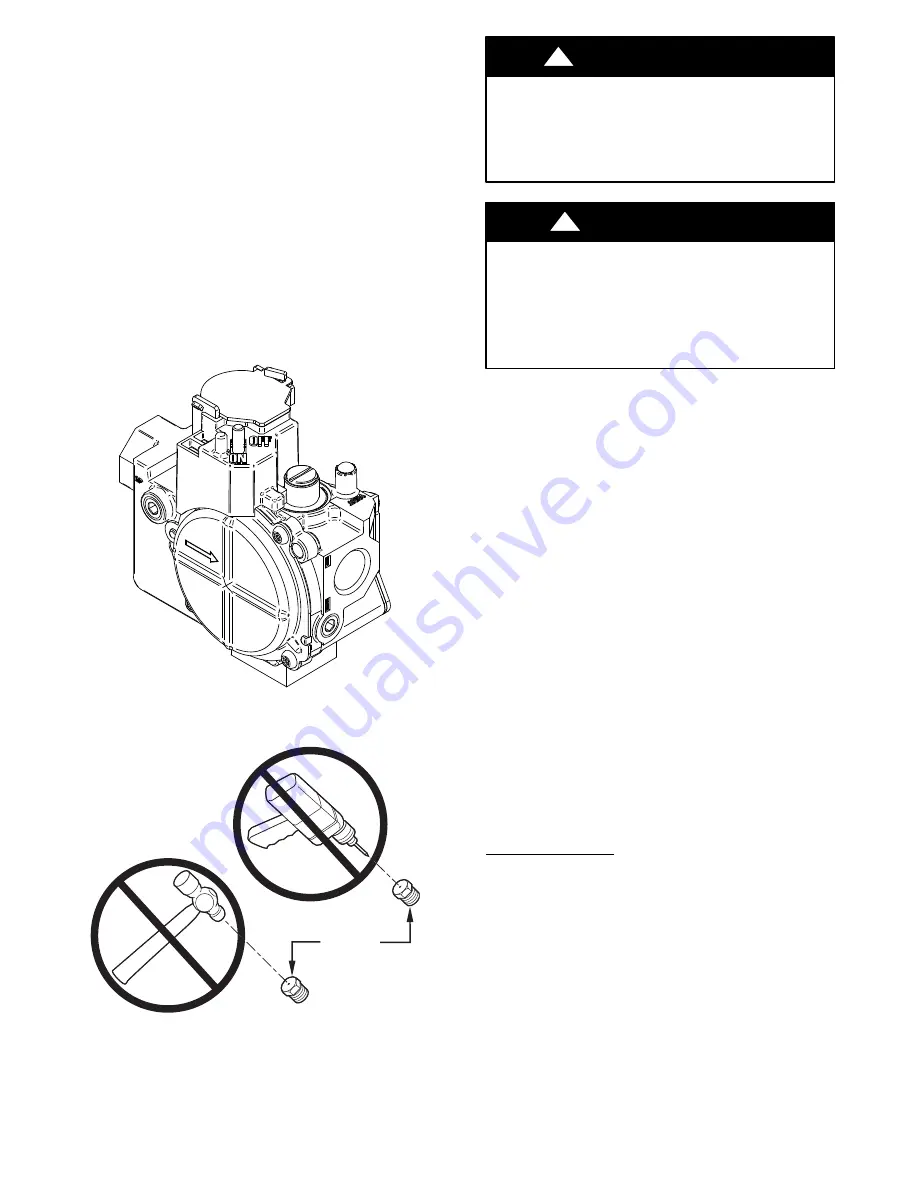
Specifications are subject to change without notice.
32
441 01 1421 02
(3.) Return and supply ducts for excessive restrictions
causing static pressures greater than 0.50
−
In. W.C.
c. Adjust air temperature rise by adjusting blower speed. In-
crease blower speed to reduce temperature rise. Decrease
blower speed to increase temperature rise
d. Turn thermostat down below room temperature and re-
move blower access door.
e. To change motor speed selection for heating, remove
blower motor lead from control HEAT terminal (See Fig.
24.) Select desired blower motor speed lead from one of
the other terminals and relocate it to the HEAT terminal
(See Table 5 for lead color identification). Reconnect
original lead to SPARE terminal.
f. Repeat steps a through e.
g. When correct input rate and temperature rise is achieved,
turn gas valve ON/OFF switch to OFF.
h. Remove manometer or similar device from gas valve.
i. Reinstall manifold pressure tap plug in gas valve.
A06666
Fig. 40
−
Gas Control Valve
BURNER
ORIFICE
A93059
Fig. 41
−
Orifice Hole
FIRE HAZARD
Failure to follow this warning could result in personal
injury, death, and/or property damage.
Reinstall manifold pressure tap plug in gas valve to prevent
gas leak.
!
WARNING
FURNACE OVERHEATING HAZARD
Failure to follow this caution may result in reduced furnace
life.
Recheck temperature rise. It must be within limits specified
on the rating plate. Recommended operation is at the
mid
−
point of rise range or slightly above.
CAUTION
!
6. Set thermostat heat anticipator.
a. Mechanical thermostat
−
Set thermostat heat anticipator
to match the amp. draw of the electrical components in
the R
−
W circuit. Accurate amp. draw readings can be ob-
tained at the wires normally connected to thermostat sub-
base terminals, R and W. The thermostat anticipator
should NOT be in the circuit while measuring current.
(1.) Remove thermostat from subbase or from wall.
(2.) Connect an amp. meter as shown in Fig. 42 across
the R and W subbase terminals or R and W wires at
wall.
(3.) Record amp. draw across terminals when furnace is
in heating and after blower starts.
(4.) Set heat anticipator on thermostat per thermostat in-
structions and install on subbase or wall.
b. Electronic thermostat: Set cycle rate for 4 cycles per hr.
7. Adjust blower off delay The blower off delay has 4 ad-
justable settings from 90 sec to 180 sec. The blower off
delay jumpers are located on the furnace control board.
(See Fig. 24.)
To change the blower off delay setting, move the jumper
from one set of pins on the control to the pins used for the
selected blower off delay. Factory off delay setting is 120
sec.
8. Set airflow CFM for cooling
Select the desired blower motor speed lead for cooling air-
flow. See Table 5
−
Air Delivery
−
CFM (With Filter) for
lead color identification.
Check Safety Controls
The flame sensor, gas valve, and pressure switch were all checked
in the Start
−
up procedure section as part of normal operation.
1. Check Main Limit Switch(es)
This control shuts off combustion control system and en-
ergizes air
−
circulating blower motor, if furnace overheats.
By using this method to check limit control, it can be es-
tablished that limit is functioning properly and will operate
if there is a restricted duct system or motor failure. If limit
control does not function during this test, cause must be
determined and corrected.
a. Run furnace for at least 5 minutes.
b. Gradually block off return air with a piece of cardboard
or sheet metal until the limit trips.
c. Unblock return air to permit normal circulation.
d. Burners will re
−
light when furnace cools down.
















































